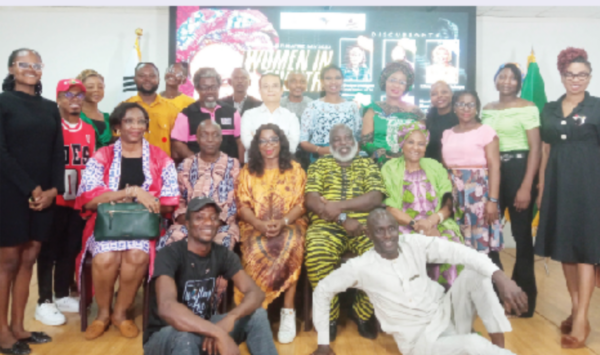Theatre women have progressed. From the early days when males portrayed women on stage to when the founder of Nigerian travel theatre Hubert Ogunde married and cast his wife in his plays for their social and financial stability.
Female actors, directors, producers, and entrepreneurs exist today. Nigerian theatrical ladies have yet to receive wreaths.

At the 2023 World Theatre Day (WTD), organized by Arojah Royal Theatre (ART) and the National Association of Nigerian Theatre Practitioners (NANTAP), women in the performing arts spoke out against objectification, labeling, and the need to write more aspiring female characters onstage and use theatre to encourage women’s political participation.
Jemimah Angulu, founder of Krump Studios, said dancers’ elegance often misinterpreted as “looseness.” Dancers attract all kinds of individuals because their bodies are their medium. Angulu said that would always be difficult.
However, Mimah (as she is known) also addressed the “strong woman” categorization of industrial executives. A term they fight and appear extremely forceful.
Strong women lead. A self-employed person is working. I’m human, not just powerful. Being in control makes me weak. No. Labels limit you because you must resist them, even indirectly.”
She stated stereotyped norms in certain societies exclude women from venues and chances. “The average man still adheres to cultural norms. Most of them, but not all, will tell you things they think are good for them.”
Actress and founder digital children storyteller (Aunty Shine Shine) Oluwaseun Odukoya stated women must fight the objectification of women in the business by producing outstanding work.
“When you are consistent and your work is always excellent, at some point, you will prove that you are worthy to be reckoned with, and your work will speak for you, whether you are a woman or not.”
Evelyn Otaigwe, a writer and filmmaker, stated women must write more inspirational female characters and promote female political engagement to secure women’s position in theatre.
Women’s political contributions are unknown. Hajiya Abba, a woman politician and activist, has not been properly portrayed in the theatre. Funmilayo Ransome Kuti, Margaret Ekpo, and others like them are unknown for their national achievements.
“The stage is the best tool for advocacy, especially when we use community theater and get people involved in the process and go through the challenges and solutions. It’s powerful. It remains.”
Otaigwe stated, “There is reason why the theatre is not thriving. Women artists must encourage more women to engage. We are society. As Nigerians, we face similar issues.
“When more participants, when more art practitioners join in policy making and law implementation, then the government will understand what needs to be done in the field of theatre. They’d continuously advocate worldwide standard bills since they know the benefits and the theatre’s business viability. If there are few of us in the polity, our voice will be quieter. The more we are, the better the theater.” said Otaigwe.
Mimah values entrepreneurship. It is essential for male and female artists in all fields to make a living.
Art communicates. It expresses. However, practitioners do this for a living and will not be satisfied or reach their potential if they are not profiting from it. Artists without entrepreneurship training will fail and be disappointed. I’ve been frustrated, therefore we need to discover how to make money without art, directly or indirectly.
Mimah advised working with like-minded individuals or venues to avoid compromising their art’s message.
“Part of the key factors and unique angles of our own entrepreneurship is seeking spaces that believe in our vision, not just in its possibility, but in the message itself.”
ART creative director Jerry Adesewo told LEADERSHIP Books & Arts that the NANTAP chose to highlight women in theatre at this year’s WTD to recognize their contributions to the industry, regardless of cost.
“We celebrate women across the space, but when they tell you their story, you’ll understand it was not easy, and that it took a lot from them, yet they don’t get their deserved flowers,” said Jerry.

